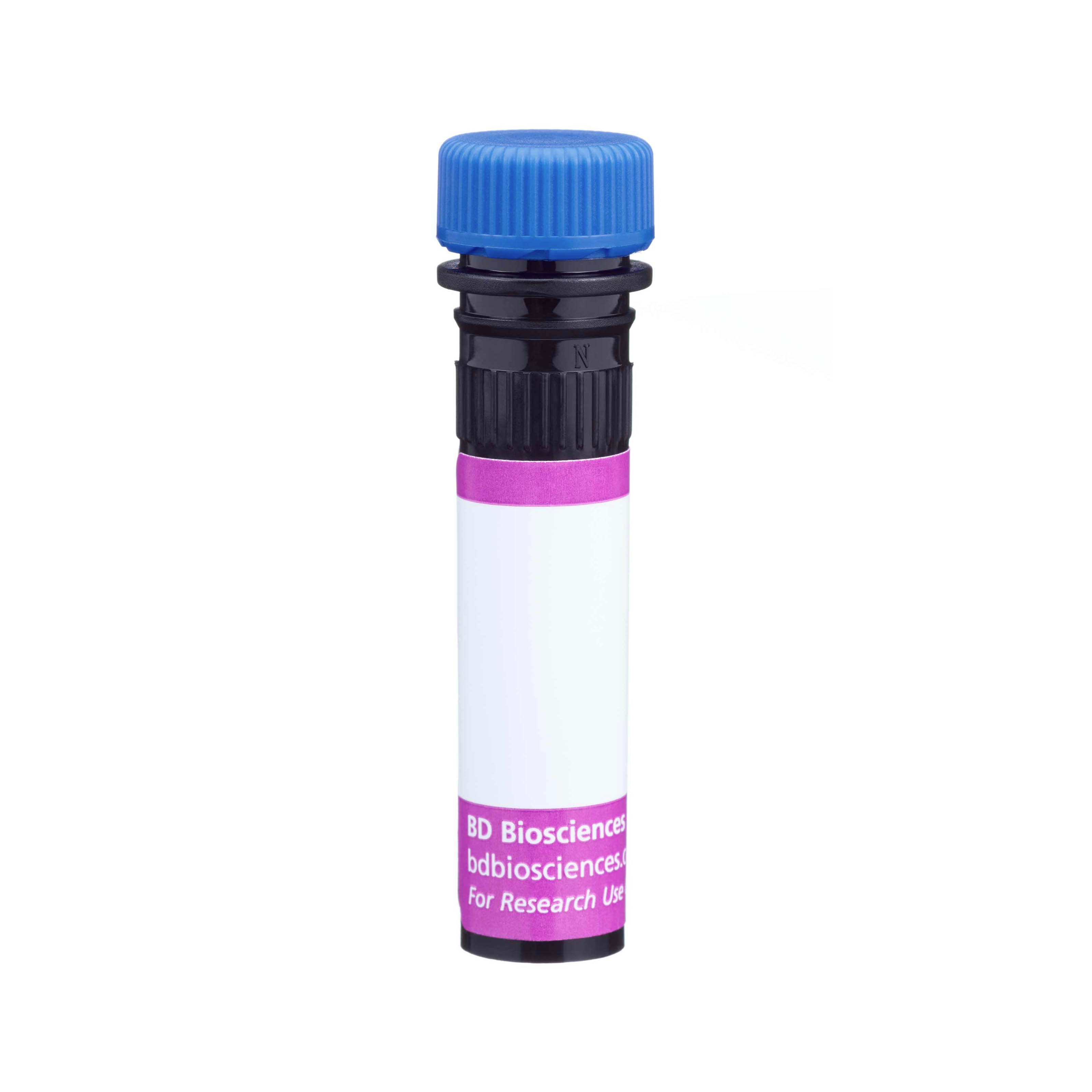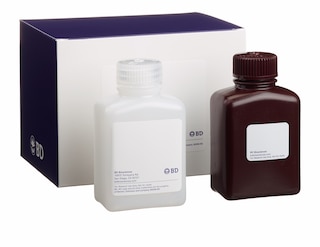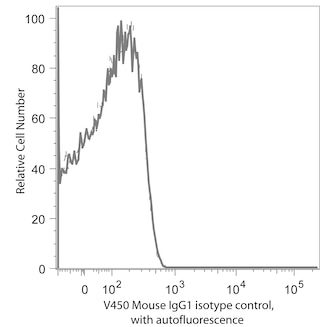-
Your selected country is
Middle East / Africa
- Change country/language
Old Browser
This page has been recently translated and is available in French now.
Looks like you're visiting us from {countryName}.
Would you like to stay on the current country site or be switched to your country?




Flow cytometric analysis for Bcl-2 in human PBMC. Human PBMC were fixed and permeabilized using BD Cytofix/Cytoperm™ (Cat. No. 554714) followed by staining either with a BD Horizon™ V450 Mouse IgG1, κ isotype control (unshaded) or with the BD Horizon™ V450 Mouse Anti-Human Bcl-2 antibody (shaded). Histograms were derived from gated events based on light scattering characteristics for lymphocytes. Flow cytometry was performed on a BD™ LSR II flow cytometry system.


BD Horizon™ V450 Mouse Anti-Human Bcl-2

Regulatory Status Legend
Any use of products other than the permitted use without the express written authorization of Becton, Dickinson and Company is strictly prohibited.
Preparation And Storage
Product Notices
- This reagent has been pre-diluted for use at the recommended Volume per Test. We typically use 1 × 10^6 cells in a 100-µl experimental sample (a test).
- An isotype control should be used at the same concentration as the antibody of interest.
- BD Horizon V450 has a maximum absorption of 406 nm and maximum emission of 450 nm. Before staining with this reagent, please confirm that your flow cytometer is capable of exciting the fluorochrome and discriminating the resulting fluorescence.
- Caution: Sodium azide yields highly toxic hydrazoic acid under acidic conditions. Dilute azide compounds in running water before discarding to avoid accumulation of potentially explosive deposits in plumbing.
- Pacific Blue™ is a trademark of Molecular Probes, Inc., Eugene, OR.
- For fluorochrome spectra and suitable instrument settings, please refer to our Multicolor Flow Cytometry web page at www.bdbiosciences.com/colors.
- Please refer to www.bdbiosciences.com/us/s/resources for technical protocols.
Companion Products





Programmed cell death (apoptosis) is a normal physiologic process which occurs during embryonic development as well as in maintenance of tissue homeostasis. The apoptotic program is characterized by certain morphological features. These include changes in the plasma membrane such as loss of membrane asymmetry and attachment, a condensation of the cytoplasm and nucleus, and internucleosomal cleavage of DNA. In the final stages, the dying cells become fragmented into "apoptotic bodies" which are rapidly eliminated by phagocytic cells without eliciting significant inflammatory damage to surrounding cells. Members of the Bcl-2 family play a major role in regulating the response of cells to apoptotic signals. Bcl-2 is considered to be novel among proto-oncogenes because it blocks apoptosis in many cell types. Bcl-2 is thought to provide selective survival advantage for cells by blocking apoptosis and thus may contribute to tumorigenesis. Bcl-2 is a ~ 26 kDa intracellular, integral membrane protein found primarily in the nuclear envelope, endoplasmic reticulum and outer mitochondrial membrane.
Clone Bcl-2/100 reacts with human Bcl-2. It has been reported not to cross-react with mouse Bcl-2. A synthetic peptide corresponding to amino acids 41-54 (GAAPAPGIFSSQPG) of human Bcl-2 was used as the immunogen. This peptide sequence reportedly is not conserved between human and mouse.
The antibody is conjugated to BD Horizon™ V450, which has been developed for use in multicolor flow cytometry experiments and is available exclusively from BD Biosciences. It is excited by the Violet laser Ex max of 406 nm and has an Em Max at 450 nm. Conjugates with BD Horizon™ V450 can be used in place of Pacific Blue™ conjugates.

Development References (29)
-
Aiello A, Delia D, Borrello MG, et al. Flow cytometric detection of the mitochondrial BCL-2 protein in normal and neoplastic human lymphoid cells. Cytometry. 1992; 13(5):502-509. (Biology). View Reference
-
Ayllon V, Cayla X, Garcia A, et al . Bcl-2 targets protein phosphatase 1 alpha to Bad. J Immunol. 2001; 166(12):7345-7352. (Biology). View Reference
-
Batistatou A, Merry DE, Korsmeyer SJ, Greene LA. Bcl-2 affects survival but not neuronal differentiation of PC12 cells. J Neurosci. 1993; 13(10):4422-4428. (Biology). View Reference
-
Chiou SK, Rao L, White E. Bcl-2 blocks p53-dependent apoptosis. Mol Cell Biol. 1994; 14(4):2556-2563. (Biology). View Reference
-
Decary S, Decesse JT, Ogryzko V, et al. The retinoblastoma protein binds the promoter of the survival gene bcl-2 and regulates its transcription in epithelial cells through transcription factor AP-2. Mol Cell Biol. 2002; 22(22):7877-7888. (Biology). View Reference
-
Hockenbery D, Nuñez G, Milliman C, Schreiber RD, Korsmeyer SJ. Bcl-2 is an inner mitochondrial membrane protein that blocks programmed cell death. Nature. 1990; 348(6299):334-336. (Biology). View Reference
-
Hockenbery DM, Oltvai ZN, Yin XM, Milliman CL, Korsmeyer SJ. Bcl-2 functions in an antioxidant pathway to prevent apoptosis. Cell. 1991; 75(2):241-251. (Biology). View Reference
-
Hockenbery DM, Zutter M, Hickey W, Nahm M, Korsmeyer SJ. BCL2 protein is topographically restricted in tissues characterized by apoptotic cell death. Proc Natl Acad Sci U S A. 1991; 88(16):6961-6965. (Biology). View Reference
-
Hsu YT, Youle RJ. Nonionic detergents induce dimerization among members of the Bcl-2 family. J Biol Chem. 1997; 272(21):13829-13834. (Biology). View Reference
-
Krajewski S, Tanaka S, Takayama S, Schibler MJ, Fenton W, Reed JC. Investigation of the subcellular distribution of the bcl-2 oncoprotein: residence in the nuclear envelope, endoplasmic reticulum, and outer mitochondrial membranes. Cancer Res. 1993; 53(19):4701-4714. (Biology). View Reference
-
Louie DC, Kant JA, Brooks JJ, Reed JC. Absence of t(14;18) major and minor breakpoints and of Bcl-2 protein overproduction in Reed-Sternberg cells of Hodgkin's disease. Am J Pathol. 1991; 139(6):1231-1237. (Biology). View Reference
-
Nguyen M, Millar DG, Yong VW, Korsmeyer SJ, Shore GC. Targeting of Bcl-2 to the mitochondrial outer membrane by a COOH-terminal signal anchor sequence. J Biol Chem. 1993; 268(34):25265-25268. (Biology). View Reference
-
Núñez G, Merino R, Grillot D, González-García M. Bcl-2 and Bcl-x: regulatory switches for lymphoid death and survival. Immunol Today. 1994; 15(12):582-588. (Biology). View Reference
-
Oltvai ZN, Milliman CL, Korsmeyer SJ. Bcl-2 heterodimerizes in vivo with a conserved homolog, Bax, that accelerates programmed cell death. Cell. 1993; 74(4):609-619. (Biology). View Reference
-
Pezzella F, Jones M, Ralfkiaer E, Ersbøll J, Gatter KC, Mason DY. Evaluation of bcl-2 protein expression and 14;18 translocation as prognostic markers in follicular lymphoma. Br J Cancer. 1992; 65(1):87-89. (Biology). View Reference
-
Pezzella F, Turley H, Kuzu I, et al. bcl-2 protein in non-small-cell lung carcinoma. N Engl J Med. 1993; 329(10):690-694. (Biology). View Reference
-
Prehn JH, Bindokas VP, Marcuccilli CJ, Krajewski S, Reed JC, Miller RJ. Regulation of neuronal Bcl2 protein expression and calcium homeostasis by transforming growth factor type beta confers wide-ranging protection on rat hippocampal neurons. Proc Natl Acad Sci U S A. 1994; 91(26):12599-12603. (Biology). View Reference
-
Reed JC, Meister L, Tanaka S, et al. Differential expression of bcl2 protooncogene in neuroblastoma and other human tumor cell lines of neural origin. Cancer Res. 1991; 51(24):6529-6538. (Biology). View Reference
-
Reed JC, Tanaka S, Cuddy M, et al. A strategy for generating monoclonal antibodies against recombinant baculovirus-produced proteins: application to the Bcl-2 oncoprotein. Anal Biochem. 1992; 205(1):70-76. (Biology). View Reference
-
Reed JC, Tsujimoto Y, Alpers JD, Croce CM, Nowell PC. Regulation of bcl-2 proto-oncogene expression during normal human lymphocyte proliferation. Science. 1987; 236(4806):1295-1299. (Biology). View Reference
-
Tanaka S, Saito K, Reed JC. Structure-function analysis of the Bcl-2 oncoprotein. Addition of a heterologous transmembrane domain to portions of the Bcl-2 beta protein restores function as a regulator of cell survival. J Biol Chem. 1993; 268(15):10920-10926. (Biology). View Reference
-
Teixeira C, Reed JC, Pratt MA. Estrogen promotes chemotherapeutic drug resistance by a mechanism involving Bcl-2 proto-oncogene expression in human breast cancer cells. Cancer Res. 1995; 55(17):3902-3907. (Biology). View Reference
-
Tsujimoto Y, Cossman J, Jaffe E, Croce CM. Involvement of the bcl-2 gene in human follicular lymphoma. Science. 1985; 228(4706):1440-1443. (Biology). View Reference
-
Tsujimoto Y, Croce CM. Analysis of the structure, transcripts, and protein products of bcl-2, the gene involved in human follicular lymphoma. Proc Natl Acad Sci U S A. 1986; 83(14):5214-5218. (Biology). View Reference
-
Veis DJ, Sentman CL, Bach EA, Korsmeyer SJ. Expression of the Bcl-2 protein in murine and human thymocytes and in peripheral T lymphocytes. J Immunol. 1993; 151(5):2546-2554. (Biology). View Reference
-
Williams GT. Programmed cell death: apoptosis and oncogenesis. Cell. 1991; 65(7):1097-1098. (Biology). View Reference
-
Yang E, Zha J, Jockel J, Boise LH, Thompson CB, Korsmeyer SJ. Bad, a heterodimeric partner for Bcl-XL and Bcl-2, displaces Bax and promotes cell death. Cell. 1995; 80(2):285-291. (Biology). View Reference
-
Yang J, Liu X, Bhalla K, et al. Prevention of apoptosis by Bcl-2: release of cytochrome c from mitochondria blocked. Science. 1997; 275(5303):1129-1132. (Biology). View Reference
-
Yin XM, Oltvai ZN, Korsmeyer SJ. BH1 and BH2 domains of Bcl-2 are required for inhibition of apoptosis and heterodimerization with Bax. Nature. 1994; 369(6478):321-323. (Biology). View Reference
Please refer to Support Documents for Quality Certificates
Global - Refer to manufacturer's instructions for use and related User Manuals and Technical data sheets before using this products as described
Comparisons, where applicable, are made against older BD Technology, manual methods or are general performance claims. Comparisons are not made against non-BD technologies, unless otherwise noted.
For Research Use Only. Not for use in diagnostic or therapeutic procedures.
Report a Site Issue
This form is intended to help us improve our website experience. For other support, please visit our Contact Us page.